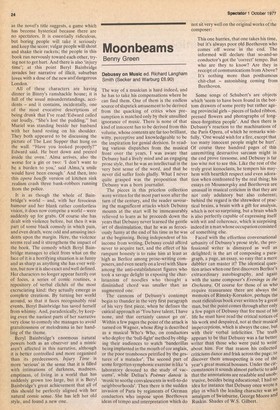Moonbeams
Benny Green
Debussy on Music ed. Richard Langham Smith (Secker and Warburg £6.90) The way of a musician is hard indeed, and he has to take his compensations where he can find them. One of them is the endless source of slapstick amusement to be derived from the quacking of critics whos presumption is matched only by their unsullied ignorance of music. There is none of that kind of innocent fun to be derived from this volume, whose contents are far too brilliant, witty, perceptive and knowledgeable to be the inspiration for genial derision. In reading various dispatches from the musical front over the years, I was aware that Debussy had a lively mind and an engaging prose style, that he was an intellectual in the very best sense of the word, and that he never did suffer fools gladly. What I never quite grasped was the proposition that Debussy was a born journalist.
The pieces in this priceless collection were written for the most part soon after the turn of the century, and the reader savouring the magnificent attacks which Debussy mounts at the start will be immeasurably relieved to learn as he proceeds down the years that Debussy never learned the gentle art of dissimulation, that he was as ferociously funny at the end of his time as he was at the beginning. Being independent of his income from writing, Debussy could afford never to acquire tact, and the effect of his rampant honesty is to raise him at least as high as Berlioz among prose-writing composers, and even nearly on a level with Shaw among the anti-establishment figures who took a savage delight in exposing the charlatanism of noodles who thought a diminished chord was smaller than an augmented one.
The cannons of Debussy's contempt begin to thunder in the very first paragraph of his very first piece, when he defines the critical approach as 'You have talent, I have none, and that certainly cannot go on'. Within a few pages the point of the attack is turned on Wagner, whose Ring is described as a musical Who's Who, on conductors who deploy the 'bull-fight' method by obliging their audiences to watch `banderillas being implanted in the mouth of cor anglais, or the poor trombones petrified by the gestures of a matador'. The second part of some forgotten symphonic exercise is like 'a laboratory devoted to the study of vacuums', while Delius's Poemes danois is 'music to soothp convalescents in well-to-do neighbourhoods'. Then there is the sudden invasion of Paris by regiments of German conductors who impose upon Beethoven ideas of tempo and interpretation which do not sit very well on the original works of the composer: This one hurries, that one takes his time, but it's always poor old Beethoven who comes off worse in the end. The informed will declare that so-and-so conductor's got the 'correct' tempo. But who are they to know? Are they in receipt of communications from Above? It's nothing more than posthumous chit-chat — astonishing coming from Beethoven.
Some songs of Schubert's are objects which 'seem to have been found in the bottom drawers of some pretty but rather ageing provincial girls — pieces of faded ribbon, pressed flowers and photographs of longsince-forgotten people'. And then there is Debussy's reaction to the machinations of the Paris Opera, of which he remarks wistfully, 'One would wish for a fire, except that too many innocent people might be hurt'. Of course three hundred pages of this unremitting destructive sarcasm might in the end prove tiresome, and Debussy is far too wise not to see this. Like the rest of the truly great iconoclasts, he tempers his mayhem with heartfelt respect and even adoration when confronted by the real thing; his essays on Moussorgsky and Beethoven are unusual in musical criticism in that they are not only adulatory but also coherent; behind the regard is the shrewdest of practical brains, a brain with a gift for analysis, which is not so surprising, but a brain which is also perfectly capable of expressing itself with wit and coherence, which is surprising indeed in a man whose occupation consisted of something else.
Faced with the effortless conversational urbanity of Debussy's prose style, the professional writer is dismayed as well as delighted; is the art of composing a paragraph, a page, an essay, so easy that a mere dabbler can master it? The identical question arises when one first discovers Berlioz's extraordinary autobiography, and again with the same composer's Evenings in the Orchestra. Of course for those of us who require reassurance there are always the memoirs of Rimsky-Korsakov, perhaps the most ridiculous book ever written by a great man, but the point comes through after only a few pages of Debussy that for most of his life he must have read the critical notices of his work and despaired, not at their musical imperceptions, which is always the case, but with their verbal infelicities. The truth appears to be that Debussy was a far better writer than those who were paid to write about him. For that reason his collected criticisms dance and frisk across the page; to discover them unsuspecting is one of the year's great musical bonuses. Under the circumstances it sounds almost pathetic to add that the annotations are readable and unobtrusive, besides being educational; I had ne idea for instance that Debussy once wrote a play in which the leading character was an amalgam of Swinburne, George Moore and Ruskin. Shades of W.S. Gilbert.


































 Previous page
Previous page